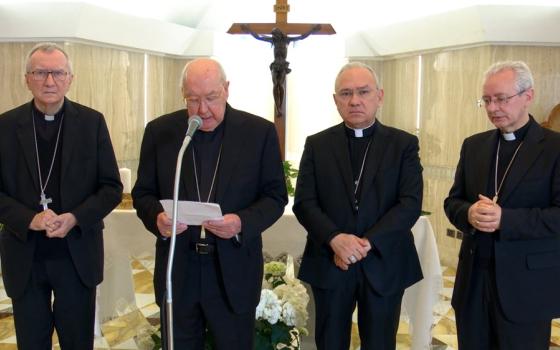
Sr. Maria Josephina goes to a remote village to conduct a free medical camp. For nearly 20 years, Korean sisters have been serving the needy in Bangladesh by providing medical and education services. (GSR photo/Sumon Corraya)
After giving birth to her child, 25-year-old Kobita Richil from Tangail, Bangladesh, suffered from anemia, preventing her from providing her daughter with breast milk. Without a hospital near her village, she was unable to receive treatment — until a group of Korean Sisters of Charity of St. Vincent de Paul stepped in.
"Sisters came to us and arranged a free medical camp," Richil told Global Sisters Report. "I took their treatment and counseling, and now I am well, and my daughter gets enough milk."
Twice a month, the "Korean sisters," as they're affectionately called, conduct free medical camps in different remote villages in the Bangladeshi Mymensingh Diocese.
When Korean Archbishop Paul Tschang In-Nam served as the apostolic nuncio to Bangladesh from 2002-2007, at that time he felt a severe lack of proper medical support for Bangladeshis, especially in remote villages. He then invited sisters from several congregations in South Korea to Mymensingh in 2006, who since then have been serving the needy by providing medical and education services.

Korean national Sr. Maria Hyo Tjou Agnes of the Sisters of Charity of St. Vincent de Paul, a nurse, treats Sohaj Dajal, a 25-year-old patient at St. Vincent's Center & Clinic, Mymensingh, June 30. (GSR photo/Sumon Corraya)
Today, the nuns (some of whom are nurses) see patients and offer medicine free of charge in the remote villages where people are otherwise unable to receive treatment.
When Nipa Sangma had a sinus headache for days, she saw the sisters. "And by their medicines, now I am free from headaches," said the parishioner of Pilgacha Catholic Church, Tangail, where Richil also belongs.
The Korean nuns have faced several challenges in conducting medical camps.
"We are merely two sisters, but when we reach any remote village, we get many patients," Sr. Maria Josephina, who is in charge of the Sisters of Charity of St. Vincent de Paul, Bangladesh, told GSR. "We take doctors to see them, but sometimes, it becomes harder to manage people to give them our treatment aptly."
In addition to navigating rough, narrow roads where police protection against robbers is paramount, the sisters also find the local language to be a challenge.

Srs. Maria Josephina, Maria Taegon Andrea and Maria Hyo Tjou Agnes, all of the Sisters of Charity of St. Vincent de Paul, Bangladesh, are pictured at St. Vincent's Center & Clinic, Mymensingh. (GSR photo/Sumon Corraya)
"We learnt Bangla, but many of the Garo tribe cannot speak Bangla fluently as their mother tongue is the Achik language," she said, adding that villagers also don't speak English. "It becomes harder to communicate with them."
Still, Josephina said she finds pleasure in seeing the smiles of needy people who have improved through their treatment.
"Getting treatment is a human right as it is a basic need, but many people don't get this basic need in Bangladesh," she said. "I get huge joy from seeing the smiles of our patients after being cured by our service. We love this as Jesus Christ taught us to take care of those who are ill."
Besides medical camps, the Korean sisters also run St. Vincent's Center & Clinic in Mymensingh city, where four doctors see patients with minimal fees.

St. Vincent's Center & Clinic in Mymensingh also serves as a shelter for the sick. Triphola, a 36-year-old stroke patient, stays at the clinic free of charge. (GSR photo/Sumon Corraya)
"I am a diabetic patient, and every month, I see myself at St. Vincent's Center & Clinic, where there are good doctors," said Rokeya Begum, a Muslim from Mymensingh. The 66-year-old senior citizen also told GSR that she pays 300 Bangladeshi takas (about $2.50) to the nuns' clinic, whereas other hospitals would cost at least 1,000 takas. The "nuns' clinic is affordable for me; they also give us discounts on medical tests and medicines," Begum said.
Josephina told GSR that their charism is to serve the poor and those in greatest need.
"To fulfill our congregation's main charism, we serve needy patients in the clinic. Besides, we also provide education in our homestay to those who are needy girls," she said, adding that although their clinic only provides outdoor services, they hope to have a fully operating hospital in the near future.

Sr. Maria Hyo Tjou Agnes of the Sisters of Charity of St. Vincent de Paul, a nurse, serves needy Catholics in a remote village in Mymensingh. (GSR photo/Sumon Corraya)
Counted as family
The Korean sisters also run a homestay: simple, clean accommodations in a peaceful environment where students can participate in prayer or Mass and enjoy home-cooked meals. It's an affordable, culturally enriching experience, ideal for rest and reflection, and is often located in convents or religious communities.
"We count them as our family members," Josephina said, adding that the sisters "provide them moral teachings like their parents, as we are their guardians of the homestay."
"Many needy parents come to us and ask us to take their children," she continued. "But we visit their family first. If we see they are really needy, at that time we receive their girl at our homestay."
When the sisters first came to Bangladesh, they received Muslim girls at their homestay. One of those girls, Shanti Islam (name changed), recently came to St. Vincent's Center & Clinic with her husband, to receive treatment. "We are living as a happy family. For getting a quality education, I am thankful to the sisters," the 22-year-old told GSR.

Sr. Maria Taegon Andrea, of the Sisters of Charity of St. Vincent de Paul, is the first local sister from her congregation, Sisters of Charity of St. Vincent de Paul, in Bangladesh. (GSR photo/Sumon Corraya)
Another former student of their homestay, Ruberium Tripura, a 22-year-old Christian, now studies at a university in Dhaka and has a job in a shopping mall. "Our former students are very thankful to us as they get our support to make their life successful," Josephina said.
Today, however, the sisters only take in Christian girls at their homestay. "Some Muslims asked students who were Muslim, 'Have you converted to Christianity? If you become Christian, we will kill you,' " Josephina shared. "We felt it is a threat to us and Muslim students, so now we don't take any Muslim needy children at our homestay.
"We merely provide quality education and a discipline of life; we have never tried to proselytize any girls," she added.
During her service in Bangladesh, Josephina said she noticed a growing number of Catholic faithful but a shortage of church buildings. "We wrote a project proposal and secured donations from Korea to build ten small chapels," Josephina told GSR.
Advertisement
From their homestay, four young girls are on their way to becoming nuns. "Our one former student named Gitaly Snal, 24, is now at the novitiate of our congregation in Quezon city of the Philippines," Josephina said. "The other two are candidates in our formation house, and another former student joined at the formation house of Holy Cross Sisters, in Dhaka," she said.
For her part, Tripura — one of more than 200 girls who benefited from the homestay — expressed her gratitude to the Korean nuns, saying that without the opportunity to study at the homestay, she might not have continued her studies.
"Like many other village girls, my parents would have arranged a child marriage," said Tripura, who now lives in the capital city of Dhaka. "But in the future, I want to be a police officer. The nuns' support has helped me greatly."







